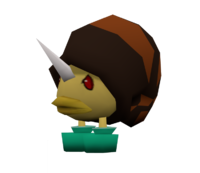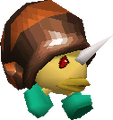Snailicorn: Difference between revisions
No edit summary |
Nintendo101 (talk | contribs) (→Names in other languages: page number) |
||
| (38 intermediate revisions by 23 users not shown) | |||
| Line 1: | Line 1: | ||
{{ | {{species infobox | ||
|image=[[File:SnailicornModel.png|200px]]<br>Model from ''New Super Mario Bros.'' | |||
|image=[[File: | |||
|first_appearance=''[[New Super Mario Bros.]]'' ([[List of games by date#2006|2006]]) | |first_appearance=''[[New Super Mario Bros.]]'' ([[List of games by date#2006|2006]]) | ||
}} | }} | ||
'''Snailicorns'''<ref>{{cite|author=Loe, Casey|title=''New Super Mario Bros.'' Player's Guide|page=12|date=May 15, 2006|publisher=Nintendo of America|language=en-us|isbn=1-59812-009-3}}</ref> are large snail-like enemies in ''[[New Super Mario Bros.]]'' Their name is a portmanteau of "snail" and "unicorn." Every Snailicorn has two small green feet and a horn on its head. Snailicorns appear only in [[World 5-3 (New Super Mario Bros.)|World 5-3]] and [[World 5-B (New Super Mario Bros.)|World 5-B]]. A Snailicorn walks straightforward on the [[platform]] it is on and turns around to avoid edges if necessary, similarly to red [[Koopa Troopa]]s. If a Snailicorn sees [[Mario]] or [[Luigi]], it charges in a straight line with its horn facing him. [[Jump]]ing on a Snailicorn's shell pushes it backward, possibly into gaps within platforms or [[pit|bottomless pits]], and [[Ground Pound|ground-pound]]ing a Snailicorn pushes it even farther back. Snailcorns can be defeated from either [[Shell Mario]]'s [[Shell Dash]] move, a [[Mega Mushroom]], or a [[Super Star|Starman]]. | |||
'''Snailicorns'''<ref>Loe, Casey | |||
The game's internal filename for "Snailicorn" is a romanization of the Japanese name for "[[Bully]]," suggesting that it was originally designed as one before being changed to a horned snail.<ref>{{cite|author=TCRF|title=[[tcrf:New Super Mario Bros.#Internal Names|New Super Mario Bros. § Internal Names]]|publisher=The Cutting Room Floor|language=en-us|accessdate=June 3, 2024}}</ref> This explains why the two species act in a similar manner. Given that it has one horn and appears only in ice [[level]]s, it may have specifically been modeled after the [[Chill Bully]]. | |||
==Names in other languages== | ==Gallery== | ||
<gallery> | |||
NSMB Snailicorn.png|Sprite from ''New Super Mario Bros.'' | |||
NSMBDS Snailicorn.png | |||
Snailicorn.png|A Snailicorn in World 5-B | |||
</gallery> | |||
==Additional names== | |||
===Internal names=== | |||
{{internal names | |||
|game1=''[[New Super Mario Bros.]]'' | |||
|file1=<tt>data/enemy/donketu.nsbmd</tt> | |||
|name1=donketu | |||
|meaning1=[[Bully#Names in other langauges|Bully]] | |||
}} | |||
===Names in other languages=== | |||
{{foreign names | {{foreign names | ||
|Jap= | |Jap=トゲツムリ<ref>{{cite|author=Shogakukan editors|title=「敵キャラクターリスト」in『ニュー・スーパーマリオブラザーズ: 任天堂公式ガイドブック』|url=i.imgur.com/rilbHbm.jpg|date=2006|language=ja|location=Tokyo|publisher=[[Shogakukan]]|page=19|isbn=4-091063-07-1}}</ref> | ||
|JapM= | |JapR=Togetsumuri | ||
|Ita=TartaSpunzo<ref>''[[Super Mario Bros. Encyclopedia|Super Mario Bros. Enciclopedia]]'' | |JapM=Portmanteau of「棘」(''toge'', "spike") and「{{Ruby|蝸牛|カタツムリ}}」(''katatsumuri'', "snail") | ||
|ItaM=Turtle Spike | |Fre=Snailicorn<ref>{{cite|date=July 4, 2018|title=''[[Super Mario Bros. Encyclopedia|Super Mario Encyclopedia]]''|publisher=Soleil Productions|language=fr|isbn=2302070046|page=114}}</ref> | ||
|Ger=Hornschnecke | |||
== | |GerM=Horn Snail | ||
|Ita=TartaSpunzo<ref>{{cite|date=November 15, 2018|title=''[[Super Mario Bros. Encyclopedia|Super Mario Bros. Enciclopedia]]''|publisher=Magazzini Salani|language=it|isbn=889367436X|page=115}}</ref> | |||
|ItaM=Turtle Spike | |||
|Spa=Caracol Spike<ref>{{cite|date=October 12, 2017|title=''[[Super Mario Bros. Encyclopedia|Enciclopedia Super Mario Bros.]]''|publisher=Planeta DeAgostini|language=es|isbn=978-84-9146-223-1|page=115}}</ref> | |||
|SpaM=Snail Spike | |||
}} | |||
==References== | ==References== | ||
| Line 25: | Line 42: | ||
{{NSMB}} | {{NSMB}} | ||
[[Category:Gastropods]] | [[Category:Gastropods]] | ||
[[Category:New Super Mario Bros. | [[Category:New Super Mario Bros. enemies]] | ||
[[de:Hornschnecke]] | [[de:Hornschnecke]] | ||
[[it:TartaSpunzo]] | [[it:TartaSpunzo]] | ||
Latest revision as of 21:26, November 3, 2024
| Snailicorn | |
|---|---|
 Model from New Super Mario Bros. | |
| First appearance | New Super Mario Bros. (2006) |
Snailicorns[1] are large snail-like enemies in New Super Mario Bros. Their name is a portmanteau of "snail" and "unicorn." Every Snailicorn has two small green feet and a horn on its head. Snailicorns appear only in World 5-3 and World 5-B. A Snailicorn walks straightforward on the platform it is on and turns around to avoid edges if necessary, similarly to red Koopa Troopas. If a Snailicorn sees Mario or Luigi, it charges in a straight line with its horn facing him. Jumping on a Snailicorn's shell pushes it backward, possibly into gaps within platforms or bottomless pits, and ground-pounding a Snailicorn pushes it even farther back. Snailcorns can be defeated from either Shell Mario's Shell Dash move, a Mega Mushroom, or a Starman.
The game's internal filename for "Snailicorn" is a romanization of the Japanese name for "Bully," suggesting that it was originally designed as one before being changed to a horned snail.[2] This explains why the two species act in a similar manner. Given that it has one horn and appears only in ice levels, it may have specifically been modeled after the Chill Bully.
Gallery[edit]
Additional names[edit]
Internal names[edit]
| Game | File | Name | Meaning
|
|---|---|---|---|
| New Super Mario Bros. | data/enemy/donketu.nsbmd | donketu | Bully |
Names in other languages[edit]
| Language | Name | Meaning | Notes |
|---|---|---|---|
| Japanese | トゲツムリ[3] Togetsumuri |
Portmanteau of「棘」(toge, "spike") and「 |
|
| French | Snailicorn[4] | - | |
| German | Hornschnecke[?] | Horn Snail | |
| Italian | TartaSpunzo[5] | Turtle Spike | |
| Spanish | Caracol Spike[6] | Snail Spike |
References[edit]
- ^ Loe, Casey (May 15, 2006). New Super Mario Bros. Player's Guide. Nintendo of America (American English). ISBN 1-59812-009-3. Page 12.
- ^ TCRF. New Super Mario Bros. § Internal Names. The Cutting Room Floor (American English). Retrieved June 3, 2024.
- ^ Shogakukan editors (2006). 「敵キャラクターリスト」in『ニュー・スーパーマリオブラザーズ: 任天堂公式ガイドブック』. Tokyo: Shogakukan (Japanese). ISBN 4-091063-07-1. Page 19.
- ^ July 4, 2018. Super Mario Encyclopedia. Soleil Productions (French). ISBN 2302070046. Page 114.
- ^ November 15, 2018. Super Mario Bros. Enciclopedia. Magazzini Salani (Italian). ISBN 889367436X. Page 115.
- ^ October 12, 2017. Enciclopedia Super Mario Bros.. Planeta DeAgostini (Spanish). ISBN 978-84-9146-223-1. Page 115.


